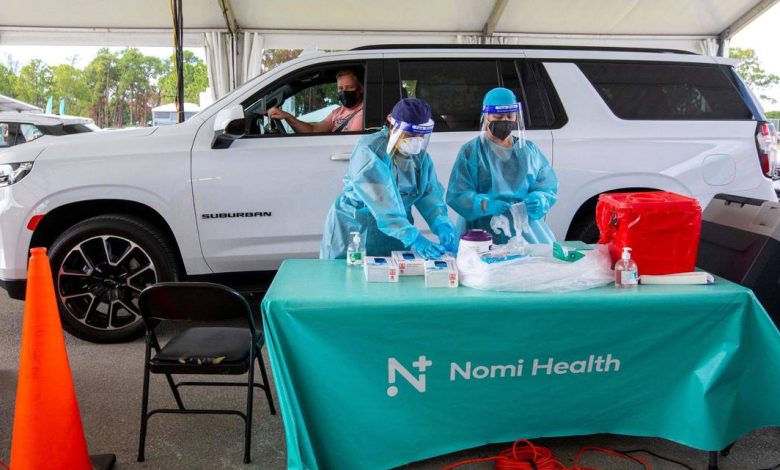COVID infections are on the rise in Florida. What to know as new variants circulate

Do you feel ill? You’re not by yourself.
Is COVID the possible cause? Given that Florida has been hit by a summer wave of the virus strain, it is becoming more likely. The good news is that in comparison to previous trends, this wave is mild.
The U.S. Centers for Disease Control and Prevention include Florida as one of 39 states where COVID infections are either increasing or are probably increasing.
In order to assess the COVID status, the CDC no longer counts cases and now uses information on ER visits, hospitalizations, and wastewater treatment. Additionally, COVID infections are rising even though national data indicates that influenza and RSV levels are still low in the United States. Hospitals in South Florida report noticing an increase in COVID cases as well, though not as much as in prior summers.
“We’re seeing a slight increase in hospitalized and ER COVID positive patients, but it’s not dramatic compared to when we had the surges in the past,” infectious diseases chief Dr. Paula Eckardt of Memorial Healthcare System, a southern Broward County public hospital system, stated.
Observe the following:
Which COVID version is most prevalent?
The alphabet soup that is COVID is still growing. And based on the most recent estimates from the CDC, KP.3 is the most prevalent variety in the nation, accounting for around 33% of all cases. KP.2, which accounts for almost 21% of cases, comes next. Additionally, LB.1, which has accelerated this month and may soon surpass its brothers, is being intensively observed by experts. The three are all descended from omicron and are variants of JN.1, which was the primary cause of many winter infections in the nation. Individuals 65 years of age and older, as well as those with impaired immune systems, continue to be the most vulnerable to severe COVID infections.
CDC spokeswoman David Daigle told CBS News that there is “no evidence that KP.3 or LB.1 cause more severe disease at this time.” “The CDC is working to better understand the potential impact on public health and will continue to track variants of SARS-CoV-2.”
Do COVID vaccinations still work?
According to CNN, research indicates that the COVID vaccines currently in use tend to be less effective against the viral variations that are currently in circulation, even though they should still offer some protection against it. However, new vaccinations should be available in the fall.
Just as flu shots are revised every year, Pfizer and Moderna should also update their autumn vaccination formulas, according to a U.S. Food and Drug Administration advisory committee’s recommendation. The FDA is requesting that the new shots more closely resemble JN.1 and its offspring, such as KP.2 and KP.3, which are also referred to as FLiRT variations. According to the Johns Hopkins Bloomberg School of Public Health, the moniker is based on the technical titles of the scientists’ mutations rather than on the scientists’ comedic sense.
What is the nation’s COVID situation? In South Florida, what about it?
According to the most recent CDC data, COVID-related ER visits have increased in the United States during the past week, with a 25% increase in hospitalizations from May 26 to June 1. In addition, more Florida residents—including those in Miami-Dade and Broward counties—have started testing positive for COVID since late May, according to recent state health data.
It’s hard to estimate the number of COVID-19 cases that exist at this time. Recall that since most test sites have closed and results from at-home tests are not disclosed, COVID testing is no longer the most accurate technique to gauge the spread of the disease. Hospitalizations due to COVID continue to be a crucial measure of the COVID condition.
There was “an all-time low number of inpatient cases” at Miami-Dade’s public hospital system, Jackson Health System, in April and May. According to the hospital, there was a slight increase in June, but not enough to have an impact on daily operations.
The Broward Memorial Healthcare System has also observed a modest increase in COVID cases in the recent past. However, fewer patients are being admitted to the hospital than in the past, and physicians are also more adept at treating patients, according to Eckardt. Memorial is no longer testing all newly admitted patients for COVID, in line with other institutions.
The most current data available to the hospital indicates that it has 91 inpatient COVID patients, which is a 38% increase from 66 cases at the end of May.
Advice for maintaining your health
People are probably being encouraged to stay inside by the intense heat, which may be contributing to the virus’s spread. Summertime travel is another thing that people do.
Eckardt advised folks to keep in mind these four crucial pointers when they begin planning their travel and July Fourth celebrations:
▪ Keep up with COVID vaccinations.
▪ Hand hygiene is important.
▪ If you’re going to be in a busy place, think about donning a mask, particularly if your immune system is impaired.
▪ Get checked and, if necessary, seek treatment if you feel ill.




